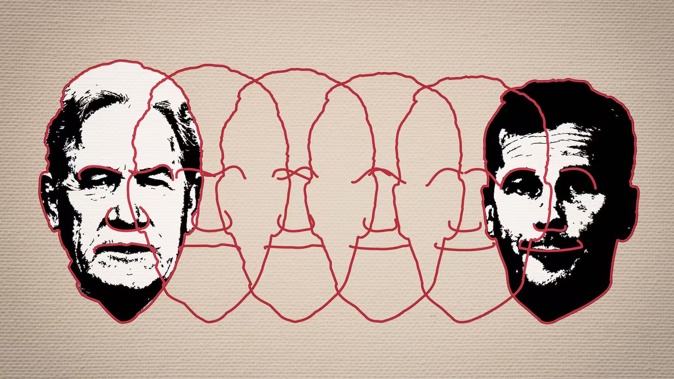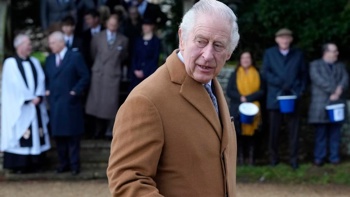
- Act leader David Seymour will become Deputy Prime Minister on Saturday, May 31, succeeding Winston Peters for the second half of the political term.
- Seymour, with whakapapa to Ngāti Rēhia, said Act is the party of individual rights and tino rangatiratanga.
- Seymour and his party do not support race-based policies, they call for “need not race”.
- Others, including doctors in a recent New Zealand Medical Journal editorial, have said ethnicity is an evidence-based marker of need in health.
Next week Act leader David Seymour will take over from Winston Peters as Deputy Prime Minister - he says they’ll be big shoes to fill.
“I’ll have to comb my hair but I’m not blow-waving,” Seymour laughed, alluding to Peters’ immaculate dress sense and appearance.
There are people who try to paint me as anti-Māori, despite me being Māori
David Seymour
Seymour, who became an MP and Act leader in 2014, will take the role as part of the 2023 coalition agreement that the leaders of the two minor governing parties would share the Deputy Prime Minister’s position.
Seymour said Act is not an anti-Māori party and Māori have nothing to fear from him.

Opposition MPs celebrated as Act leader David Seymour left the House after the Treaty Principles Bill was voted down. Photo / Mark Mitchell
Being Māori
Act has been a driver of policies some people have criticised as divisive - such as the scrapped Treaty of Waitangi Principles Bill and the Waitangi Tribunal Review.
National, Act and NZ First wanted the Māori Health Authority - created to address health inequities faced by Māori - scrapped.
Labour MP Willie Jackson once labelled Seymour a “useless Māori and New Zealand’s most dangerous man because of his policies”.
Seymour though, said he’s proud of his whakapapa, which he received through his late mother, Victoria.
“There are people who try to paint me as anti-Māori, despite me being Māori. I’m very proud of my heritage,” Seymour told the Herald.

A young David Seymour with his mum Victoria and dad Breen.
“My maternal grandmother’s McKay family came to New Zealand last century and arrived in Gisborne in about 1907. The Faithfulls, on my mum’s dad’s side, lived in the Dargaville area,” he said.
“The Faithfulls were related to descendants of Maraea Te Inutoto from Waimate North. She was a high-status member of Ngāti Rēhia. We understand that she and her husband Stephen Wrathall settled near Taipā. She’s my great-great-great-grandmother. That’s my Māori whakapapa.”
Defending Act
Seymour said Act is a party of open minds and open arms.
“Act is the party of tino rangatiratanga. That’s the ability for each of us to self-determine and not be put in someone else’s box,” he said.
“People have these empty slogans about me, but when I ask them to tell me an example of something I’ve said or done to support their view that I’m racist, they can’t,” Seymour said.
“Despite protesting that they have to move on from the past and be more respectful of diversity, the media often report Māori are one homogenous group who think as one and speak with one voice.
“That’s not true and quite offensive to say that about any group.”

ACT leader David Seymour had his microphone taken away during his speech at Waitangi in February. New Zealand Herald photograph by Dean Purcell.
Asked about the scrapping of the Māori Health Authority, the promotion and then demise of the Treaty Principles Bill, the review of the Waitangi Tribunal and the minimisation of te reo Māori for teachers and public servants, Seymour said: “As New Zealanders of any ethnic background, you have equal rights, based on your needs. Nothing has been taken away, except for institutions that attempt to divide us into homogeneous groups of people based on race.
“New Zealand is made up of people from a mosaic of backgrounds.
Act leader David Seymour and Minister for Children Karen Chhour. Photo / RNZ
“My colleague Karen Chhour is a Māori. She is also European and has a husband who was a Cambodian refugee. She can draw on all those heritages.
“But it seems bizarre that Karen and her children should have to choose between a Māori Health Authority or a non-Māori Health Authority. She is as representative of New Zealand’s whakapapa as anybody.
Needs not race
“Needs Not Race, which is an Act Party policy and adopted by the Government, says that we should be focusing on the need of each person," Seymour told the Herald.
Seymour said many Māori do very well and don’t need government support or assistance.
“So let’s help the people in need and not focus on their ancestry.”
In September a New Zealand Medical Journal editorial in the name of six public health academics said the “needs not race” directive was “an affront to scientific and public health knowledge” and “requires explicit rejection” from health professionals and scientists as it was not evidence-based.
Lead author Dr Belinda Loring, a public health physician at the University of Auckland, said ethnicity was an evidence-based marker of need within the health system.
The editorial noted that New Zealand’s bowel screening programme was initially based on age, which failed to recognise that more than half of Māori cancers occurred before the screening threshold of 60 years.
“Suggesting ... ‘colour-blind’ variables may be better proxies for health need than ethnicity is blatantly untrue and misleading, and encourages weak analytical science and will likely lead to greater waste of public resources due to less effective targeting of resources towards groups with highest need,” the editorial said.
18 months in Government
Looking back over the first 18 months of the coalition government, Seymour said his best and worst moments of being a Māori MP came at Waitangi when he tried to speak at the marae.
“I had an amazing 24 hours in February, when people took away my microphone at Waitangi and were afraid to let me speak,” he said.
“24 hours later, I spoke as associate education minister at the opening of St Stephens ... as a Māori charter school.
“Through charter schools we are giving Māori a choice to go to a Māori school or to the state school.”
Asked why Māori would consider voting for Act, Seymour said it was simple.
“Because you are a person with hopes and dreams and you want the opportunity to realise those dreams. You don’t want to be typecast or tied up in red tape.
“You just want a chance to use your time on Earth the best way.
“You want a job, good education for your children and a thriving economy.
“I have no reason to believe that a person with Māori heritage is likely to want that less than anyone else.”
Joseph Los’e is an award-winning journalist and joined NZME in 2022 as Kaupapa Māori Editor. Los’e was a chief reporter, news director at the Sunday News newspaper covering crime, justice and sport. He was also editor of the NZ Truth and, prior to joining NZME, worked at urban Māori organisation Whānau Waipareira.
Take your Radio, Podcasts and Music with you









